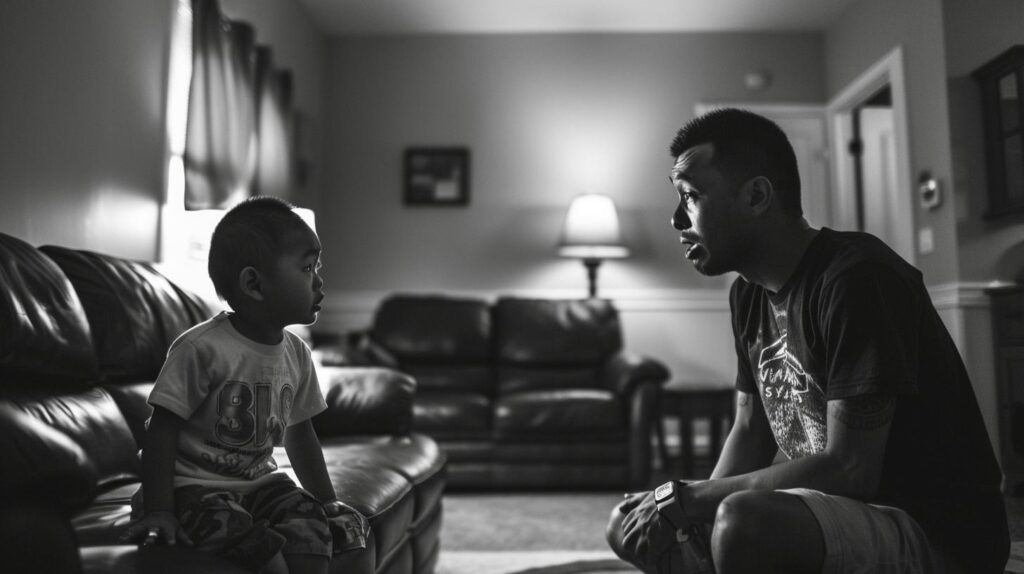Is fear driving your parenting decisions? Fear-based parenting often uses control and manipulation to manage children's behavior, grounded in the belief that without these methods, children will fail to learn essential life lessons. But what are the real impacts of this approach? This article explores the profound effects of fear-based parenting, offering insights and practical tips to help parents create a nurturing environment. Understanding these consequences can help you make informed choices that promote your child's mental well-being and foster a positive parent-child relationship. Dive in to discover how to break free from a cycle of fear.
What is Fear-Based Parenting?
Fear-based parenting involves using manipulation and control to engineer children's behavior. This parenting method relies heavily on instilling fear of consequences to ensure compliance. Parents may employ threats, punishments, or intimidation to make sure their children follow rules and meet expectations. The underlying belief is that without such tactics, children will become unruly and fail to learn essential life lessons.
Common fear-based tactics include:
- Threats of punishment: Warning children of severe consequences if they disobey.
- Yelling or shouting: Raising one's voice to intimidate and enforce rules.
- Withholding affection: Refusing to show love or approval when children misbehave.
- Public humiliation: Embarrassing children in front of others to correct behavior.
- Excessive monitoring: Constantly overseeing children's actions to prevent mistakes.
Culturally, fear-based parenting is driven by the notion that strict control is necessary for proper child development. Many parents worry that without firm discipline, their children will fail to respect authority and struggle in life. This belief often stems from generational practices and societal pressures, emphasizing the need for obedience and conformity.
The Negative Effects of Fear-Based Parenting

Fear-based parenting can significantly impact a child's ability to learn from mistakes. When parents use threats or severe punishments, children may become too frightened to take risks or explore new activities. This fear of negative consequences can stifle their natural curiosity and hinder their learning process. Instead of understanding the value of mistakes as opportunities for growth, children may become overly cautious and avoid situations where they might fail.
| Effect | Description |
|———————|—————————————————————————–|
| Decreased Self-Confidence | Children may doubt their abilities and feel inadequate. |
| Increased Anxiety | Fear of punishment can lead to chronic stress and anxiety. |
| Lack of Resilience | Children may struggle to cope with setbacks and challenges. |
| Damaged Relationships | The parent-child bond can weaken due to constant fear and control. |
The psychological effects of fear-based discipline are profound. Children raised under constant fear may develop anxiety disorders or display symptoms of chronic stress. This heightened anxiety can result from the anticipation of harsh punishments, making it difficult for children to relax and enjoy their childhood. Furthermore, the lack of emotional safety can prevent them from developing a secure sense of self, leading to long-term mental health challenges.
In addition to mental health issues, fear-based parenting can severely affect resilience and relationship dynamics. Children who are not allowed to make mistakes and learn from them often struggle to build resilience. They may become dependent on others for direction and validation, lacking the confidence to handle challenges independently. Moreover, the parent-child relationship can suffer as children may view their parents more as enforcers of rules rather than sources of support and love. This strained relationship can lead to higher rates of rebellion and defiance as children seek autonomy and escape from an overly controlled environment.
Real-Life Examples of Fear-Based Parenting
Fear-based parenting often manifests through restrictive and controlling behaviors. Real-life examples illustrate how these methods can have lasting emotional and psychological effects on children.
-
Forbidding Playground Activities: Parents may prevent children from engaging in normal playground activities due to fear of injury. This overprotectiveness can hinder a child's physical development and social interactions, leaving them overly cautious and fearful of new experiences.
-
Using Threats to Ensure Compliance: Some parents use threats, such as taking away privileges, to ensure their children follow rules. This approach can create a climate of fear, making children anxious and stressed about making mistakes or failing to meet expectations.
-
Severe Punishments for Minor Infractions: Implementing harsh punishments for small misbehaviors, like excessive chores or grounding for a minor slip-up, can lead to feelings of resentment and rebellion. Children may develop low self-esteem and harbor long-term negative emotions towards their parents.
These examples underline the significant emotional and psychological impacts of fear-based parenting. Restrictive behaviors and severe punishments can erode a child's confidence and sense of safety. This approach can instill a pervasive sense of fear, resulting in anxiety, low self-esteem, and strained parent-child relationships. Over time, the emotional scars from such parenting methods can affect a child's ability to form healthy relationships and develop resilience, perpetuating a cycle of fear and control into adulthood.
Strategies to Overcome Fear-Based Parenting

Shifting from fear-based to positive parenting techniques is essential for fostering a healthy and supportive environment for children. By adopting compassionate and structured methods, parents can encourage growth and resilience in their children.
Positive Parenting Techniques
Leading with compassion and love is the cornerstone of positive parenting. Instead of using threats or punishments, parents should communicate with empathy and understanding. This approach helps children feel valued and secure, promoting better emotional development.
Setting clear expectations is also crucial. When children know what is expected of them, they can better understand boundaries and rules. Logical consequences, rather than severe punishments, should be used to guide behavior. For example, if a child forgets to complete their homework, a logical consequence might be losing some screen time until the task is finished.
Teaching calming strategies can help children manage their emotions effectively. Techniques such as deep breathing, mindfulness, and counting to ten can empower children to handle stress and frustration. These strategies not only reduce the likelihood of emotional outbursts but also equip children with tools they can use throughout their lives.
Transforming Parenting Triggers
Recognizing and changing fear-based reactions is vital for overcoming fear-based parenting. Parents should reflect on their triggers and understand why they react with fear or control. This self-awareness can lead to more mindful and intentional responses.
Collaborating with partners is another effective strategy. When both parents are on the same page, they can present a united front and provide consistent guidance. Discussing parenting approaches and aligning strategies ensures that children receive a cohesive and supportive upbringing. This collaboration can also help parents hold each other accountable, reducing the likelihood of reverting to fear-based methods.
By adopting these strategies, parents can create a nurturing and positive environment that fosters healthy development and strong parent-child relationships. Through compassion, clear communication, and self-awareness, the cycle of fear-based parenting can be broken, paving the way for a more supportive and empowering parenting approach.
Expert Opinions and Research on Fear-Based Parenting
Research indicates that fear-based parenting can lead to higher rates of anxiety and behavioral issues in children. Studies show that children who are exposed to constant fear and control are more likely to develop anxiety disorders, depression, and other mental health problems. These children often exhibit increased behavioral issues, such as defiance, aggression, and difficulty in social interactions. The stress of living under fear-based discipline can have long-lasting impacts, affecting a child's overall well-being and ability to form healthy relationships.
- Prioritize emotional connection: Building a strong emotional bond with children helps them feel secure and understood.
- Use positive reinforcement: Encourage good behavior through praise and rewards instead of punishment.
- Set clear and consistent boundaries: Clearly defined rules and consistent consequences promote a sense of stability.
- Model appropriate behavior: Demonstrate the behaviors you want to see in your children through your actions.
The psychological effects of fear-based parenting are profound and multifaceted. Children raised in such environments often experience chronic stress and a heightened sense of fear, which can impede their emotional and cognitive development. Experts suggest focusing on connection and understanding rather than control and punishment. By fostering a nurturing and supportive atmosphere, parents can help children develop resilience, self-esteem, and healthier coping mechanisms. This shift not only benefits the child's immediate mental health but also sets a foundation for more positive long-term outcomes.
Long-Term Effects of Fear-Based Parenting

Fear-based parenting can have significant long-term effects on children, extending far beyond their early years. One of the primary consequences is ongoing issues with self-esteem. Children raised in an environment dominated by fear and control often internalize negative beliefs about themselves. They may struggle with feelings of inadequacy and doubt their abilities, leading to lower self-confidence and a lack of self-worth. Additionally, the constant fear of punishment can result in chronic stress and anxiety, creating a foundation for mental health challenges such as depression and anxiety disorders.
- Self-esteem: Ongoing issues with self-esteem, leading to low confidence and self-worth.
- Mental health: Increased risk of anxiety, depression, and other mental health challenges.
- Relationships: Difficulties in forming healthy relationships due to trust issues and fear of vulnerability.
The impact of fear-based parenting often perpetuates an intergenerational cycle of fear and control. Children who grow up in such environments may adopt similar parenting methods with their own children, believing that strict discipline and control are necessary for proper upbringing. This cycle can continue across generations, making it challenging to break free from the harmful effects of fear-based parenting. Understanding these long-term impacts is crucial for parents seeking to create a more supportive and nurturing environment for their children.
Final Words
In the action of defining fear-based parenting, it's evident how this approach uses control to engineer behavior through fear. While these tactics might ensure compliance, they come with significant negative effects.
Fear-based parenting hinders learning and damages mental health. Real-life examples show how severe punishments and threats lead to long-term emotional consequences. However, there are actionable strategies to overcome this method, focusing on positive alternatives like compassion and understanding.
Research and expert opinions reinforce the need to move away from fear-based tactics, highlighting severe long-term effects like mental health challenges and relationship difficulties. Embracing positive parenting strategies can lead to healthier, happier children.
FAQ
What is fear-based parenting?
Fear-based parenting involves using manipulation and control, driven by fear of consequences, to manage children's behavior.
What are some examples of fear-based parenting?
Examples include forbidding activities due to fear of injury, using threats for compliance, and severe punishments for minor issues.
What are the consequences of fear-based parenting?
Fear-based parenting can lower self-confidence, cause anxiety, and damage the parent-child relationship.
How can you tell if a child is scared of a parent?
Signs may include avoiding eye contact, displaying anxious behaviors, or being excessively compliant around the parent.
What does research say about fear-based parenting?
Research indicates it leads to higher rates of anxiety and behavioral issues in children.
Is fear-based parenting considered abuse?
Fear-based parenting can be emotionally abusive if it consistently uses fear to control or manipulate children.
What is the opposite of fear-based parenting?
The opposite is positive parenting, which focuses on love, compassion, and understanding rather than control and punishment.
What is an example of fear-based decision-making?
Forbidding a child from joining a club due to fear of them getting hurt is an example of fear-based decision-making.
What is a fear-based approach?
A fear-based approach uses threats and fear of consequences to ensure compliance and control behavior.


